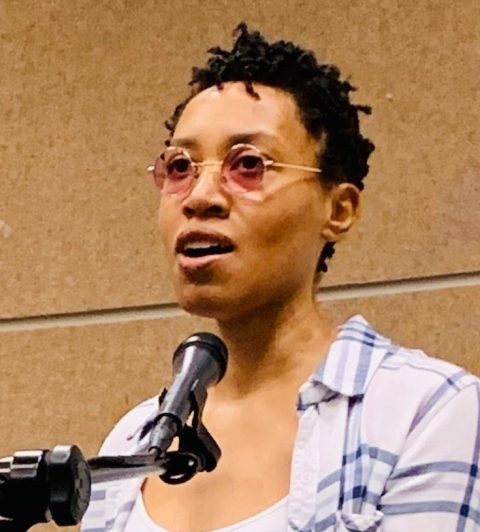We are so excited to have you joining us as our Fall Guest Editor! It seems impossible to talk about anything right now — especially as the school year begins — without talking about the global pandemic we are currently living through. How does this fall look different for you? Are you teaching in-person or online?
I’m faculty at Fresno State, which is part of the California State University system. All CSU campuses are online this fall and potentially spring as well. It is a relief because the campuses are mostly commuter hubs for the regions they are located in. I have had all online semesters before, so the structure is not different for me; the life outside of teaching, however, is very different. Traveling and socializing on the surface of course felt restricted initially, but lately I’ve been more inclined to look at this new life as something to reevaluate and explore. Normal is gone forever. We all must mourn our former routines and calendars. What was habitual is now experimental. Movement is essential to life, so I have to keep my body moving and active along with my writing. I leave my home to write just about every day, and I’ve been writing by hand, something I haven’t done for many years. The slower pace and quiet sound of the pen on paper instead of the beating of a keyboard feels soothing and rhythmic. As far as the greater world, my outlook is not hopeful ha (not to be gloomy), but my perception is one of acceptance and awe. Hope suggests I have a desired outcome that I’d like to see manifest. Hope might be too ambitious, too retro, too obsolete for these hours. Extraordinary adventures don’t begin with hope, they begin with a thrill of anticipation, uncertainty and excitement for the unknown. That might be the most honest and sensible place to begin this new school year and everything after.
As an editor, what kind of stories are you looking for? Are there certain themes or styles you gravitate toward?
I love a sense of humor, an effortless obsession with the ridiculousness of civilization and people that take themselves seriously in silly circumstances. I think of myself as a voice writer. The way people speak is fascinating and different as finger prints. Writing that can capture that variation in characters is always fun. Unusual structures of stories, a combination of forms is nice as well, but not as easy to pull off with people that read a lot. I’d prefer a traditional structure with an exciting character over a seemingly elaborate layout on the page. Also, stories that cover large periods of time, whole lifetimes or generations in a short amount of space is great too.
Congratulations on your next story collection, HOW TO WRESTLE A GIRL, which is forthcoming next year from MCD Books/Farrar Straus and Giroux! What can you tell us about this collection?
There is a mix of flash fiction and longer stories in there, some are connected pieces that reach back into my previous collection Black Jesus and Other Superheroes. A definite sports theme is in there as well. I feel like athletic women and girls aren’t written about often enough. I’m more athletic in my mind than in real life, but the women I hang out with are pretty active and competitive. As much as we like to think we are enlightened about what women are capable of and how they should be portrayed as empowered and strong there is still this inclination towards a particular kind of strength. Women that have an opinion are considered strong. Let’s think about that. To have a thought and share it is somehow revolutionary? Women that are on social media often would know that having an opinion is often seen as an invitation to be attacked in ways that are not reserved for men. Imagine that and being physically strong. It is not at all the norm at least outside of my own mind. I’ve been writing with myself as my primary audience for a while now, which I highly recommend to all my students. I wrote with less magic realism and more science fiction in some ways. So, this collection is all power with a sprinkle of hilarity and touch of gay.
You’ll be teaching in our next online workshop. For those of us who aren’t taking the class, can you give us a snapshot of the topic you’re covering?
I’m going to cover time and voice mostly, how to leap across years and decades in short spaces as well as paying attention to character speech patterns even if it is a third person narrator. Time is an important element to flash fiction because I think a lot of people view it as just a scene or early writers spend a lot of wasted space on the page trying to figure out how to move their characters from one moment to another. Flash fiction requires us to think like a Star Trek crew, beam from one crisis to another or jump from one star to the next at warp speed. Forgive the geek speak. We’ll also do exercises on diction and syntax to convey mood, intention and personal history.


 A SmokeLong Summer 24!
A SmokeLong Summer 24!